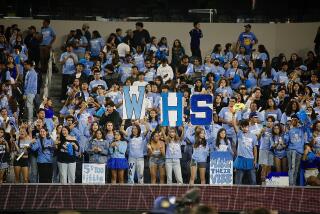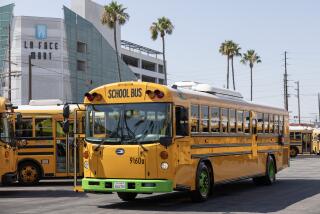High School Booster Clubs to Gamble on Education : Long Beach Parents Turn to Bingo to Fund Activities, ‘Extras’
- Share via
LONG BEACH — Bingo will be the new game at local high schools this fall as parents turn to gambling to support their children’s education.
Booster clubs at Lakewood, Millikan and Wilson high schools are getting ready to pass out bingo cards to help pay for extracurricular activities, such as sports teams, drama clubs and academic organizations.
Parents at the other two high schools in the Long Beach Unified School District--Poly and Jordan--also are working on bringing bingo to their campuses, but have set no target date.
Parents say the games could generate more than $80,000 a year at each school to pay for such things as new band uniforms and sports equipment.
The majority of school board members are not enthusiastic about the idea, although they said they do not plan to oppose bingo games.
“It’s terribly tempting, but it just makes me sick,” said board member Harriet Williams. “I think taxes should pay for the schools and not gambling. On the other hand, they’re tired of grubbing around for a dime here and a dime there.”
Board President Jenny Oropeza and member Bobbie Smith agreed with Williams. “I think it sends out a wrong message,” Oropeza said.
Board member Jerry Shultz said, however, that he has “no problem with it at all.”
“It’s really hypocritical for people to say, ‘We shouldn’t have bingo because it’s gambling,’ ” Shultz said. “We’re surrounded by Lotto, horse racing--and the biggest users of bingo are churches.”
Board member Karin Polacheck described bingo as “an unfortunate necessity.”
Parents and booster clubs will be coordinating and running the games, since the district will not be involved, Polacheck said. “It’s a wonderful commitment from them,” she said.
Ed Eveland, the district’s assistant superintendent of secondary schools, said: “It doesn’t bother me a bit. People can go anywhere else in town (for bingo.) I’d just as soon see those profits come to us.”
While booster club members say they do not need an official vote from the school board, they do plan to go before the Long Beach City Council to seek support for a popular game, pull-tab, that would be offered at bingo games. Pull-tabs are banned in Long Beach, but not in Lakewood, said Mary Kay Toumajian , a parent at Wilson High who is coordinating all of the schools’ bingo efforts.
The concept of pull-tabs is similar to that of slot machines. The game consists of small cards that have tabs that pull away to reveal a combination of pictures, such as three cherries or two oranges and a cherry. Because the lucrative game could double profits for the schools, booster clubs plan to ask the council to change the city law.
Deputy Police Chief David Dusenbury, who heads the department’s vice unit, said that Long Beach police have traditionally been wary of pull-tabs because “there is some possibility of manipulation.” Dusenbury said he will research, among other things, whether the cards are now better made to avoid fraud.
“If we see pitfalls, we’ll point them out to the council,” Dusenbury said. “But the decision is up to them.”
Mayor Ernie Kell said last week that he is “inclined to support (the request) if they have the proper support from the community.” Noting that pull-tabs are played in other cities, Kell said: “The churches do it, and it certainly hasn’t corrupted the churches.”
Booster club representatives first began planning for bingo at a meeting in June, 1988, said Toumajian, who organized the meeting.
A nonprofit umbrella organization for various booster clubs at each school will run the games. Revenues to individual booster clubs will be determined by a point system in which clubs will be rated by how many parents work each game and the amount of money generated on a particular night.
At Jordan High, the booster club is too small to run bingo games. As a result, school officials and parents are asking community service clubs to consider holding the weekly games, Principal Alta Cooke said. As many as 300 parents may be involved year-round at other schools, but Jordan’s club has about 12 members, Cooke said.
Bingo can be profitable for schools. At Edison High School in Huntington Beach, Monday night games net between $6,000 and $8,000, or about $350,000 annually, said Principal Brian Garland.
“It would be difficult to maintain the quality of our extracurricular program without bingo,” Garland said. “It’s almost becoming essential.”
In addition to supporting sports and music programs, the bingo revenues at Edison have paid for scholarships, computers for the English department, a security system for the library and special gloves, goggles and aprons for the science department, Garland said.
Bingo games subsidize sports and other activities in schools throughout Southern California, including Los Angeles and Orange, San Diego and Ventura counties.
ABC Dropped Idea
At the ABC Unified School District, officials considered bingo games a few years ago, but dropped the idea because “at the time, the board did not feel it was the way to go,” said Mara Clisby, the district’s secondary education director.
The Long Beach district allocates $10,000 to each school for extracurricular activities, Eveland said. The district also pays for coaches’ salaries, some sports equipment and transportation costs. But some school officials and parents say that’s not enough.
While the district’s contribution has remained about the same, bingo supporters note that:
* The cost of equipment, ranging from soccer balls to cheerleader uniforms, has gone up.
* Girls’ sports teams are growing in popularity, but additional money has not been provided.
* The addition of ninth-graders to high schools for the first time this year will increase the number of students involved in extracurricular activities.
The needs are many and growing, say school officials and parents.
“Some of our band uniforms are 20 years old,” grumbled Jeanne Ellis, the Wilson High activities director. “Some have been taken in and out so many times that they’re threadbare.
“We have a tough time instilling pride and school spirit when things get old and you can’t replace them,” Ellis said.
The Wilson High football stadium, for example, has long been in need of a paint job, partly to cover some of the seats’ splinters, Ellis said. Last year, there was only enough money to paint half the stadium in the school colors of red and gold, she said.
Budget of $200,000
Wilson’s annual budget for extracurricular activities is $200,000, “and that’s pared-down-to-the-bone amount,” Ellis said. Besides the district’s $10,000 allocation, about $161,000 comes from game tickets and yearbook sales. The rest is generated by such fund-raisers as candy sales and car washes, Ellis said.
Parents and coaches say they hope bingo will eliminate the need for most--if not all--of those fund-raisers.
“In the girls swim club, they have ‘a-thons.’ Every ‘a-thon’ you can think of,” said Toumajian, whose daughter is a swimmer. In addition to activities such as swim-a-thons, there are the M & M’s candy sales, the car washes and other ventures the various clubs employ.
“It seems that we go from one sale to another,” Toumajian said. “There comes a point when you can’t ask another friend to buy something.”
Reducing street sales also would relieve some parents who worry about their children going door-to-door, said LeVon Powell, president of the Baseball Booster Club at Millikan High.
And the bingo money will also support academic activities, said several parents and school officials. At Lakewood High, for example, the PTA plans to participate in the bingo games to pay for college scholarships, according to James Wickman, school activities director.
But being a member of a sports team or a choir can be just as important as academic endeavors for many students, noted Linda Benson, a member of the Poly High Booster Club.
“It’s the extracurricular activities that keep the kids going and keeps them off the streets,” she said.
More to Read
Sign up for Essential California
The most important California stories and recommendations in your inbox every morning.
You may occasionally receive promotional content from the Los Angeles Times.










